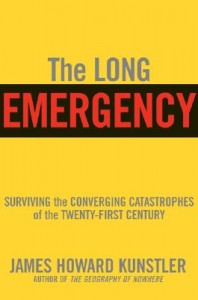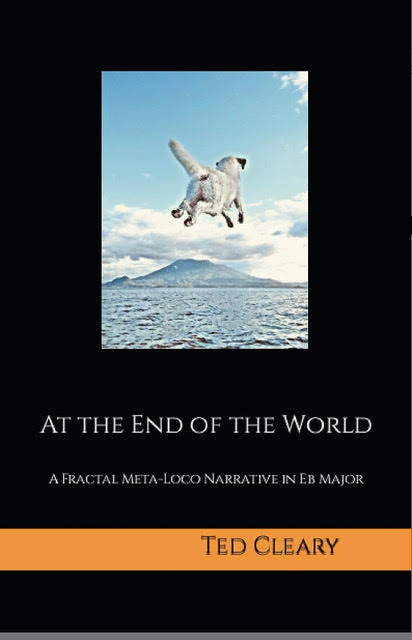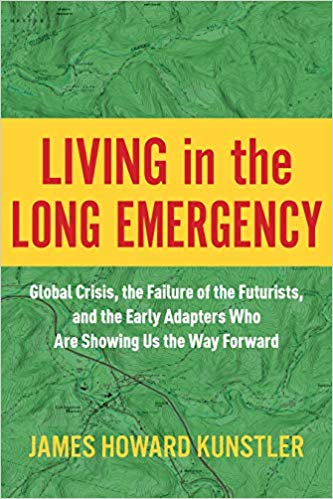Support this podcast by visiting Jim’s Patreon Page
Informal Q and A session with questions from listeners with Jim Kunstler, host of The Kunstlercast. This is an experiment, of course, and I understand now why I haven’t done it before. It’s not easy spouting off into a microphone and remaining coherent. I hope it works for all y’all. I’ll bee back in the usual format with a guest interview in a couple of weeks. Hope you’re having a great summer.
Direct Download: http://traffic.libsyn.com/kunstlercast/KunstlerCast_305.mp3
Please send questions and comments to jhkunstler@mac.com.
This blog is sponsored this week by McAlvany ICA. To learn more visit: https://icagoldcompany.com/
Just Out! Previously Unpublished!
Number 5 in the Jeff Greenaway Series
Something Strange is going on at Camp Timahoe
in Lost Indian, Vermont, summer of 1962
“Rollicking fun”
$7.50 — Cheap! Buy!
New Paintings by JHK 2016 — 2017
Great Summer Reading… JHK’s Hippie Novel!
“Simply the best novel about the 1960s.”
Read the first chapter here (click) on Patreon
Buy the book at Amazon or click on the cover below
or get autographed copies from Battenkill Books
Now in Paperback !
Only Seven Bucks!
 JHK’s Three-Act Play
JHK’s Three-Act Play
A log mansion in the Adirondack Mountains…
A big family on the run…
A nation in peril…
Other Books by JHK
The World Made By Hand Series:
Book 1: |
Book 2: |
  |
  |
Book 3: |
Book 4: |
  |
  |
 |
 |
  |
  |
Support this blog by visiting Jim’s Patreon Page
















Since the age of oil a the construction of infrastructure has switched to rather flimsy mass produced materials with relatively short lifespans and an insatiable need for maintenance. The contrast with the old ways of doing things seems to be the switch from from labor intensive to energy intensive. Is it just possible that energy intensive materials and methods are inherently unstable? Thermodynamics tend toward equilibrium. Great departures from that don’t seem to last. Seems to me the next several decades will see industrial society’s death by decrepitude. Maintenance will suffer and like replacements will be out of the question. Cleaning up after what can’t be repaired or replaced may be equally difficult or impossible. Two examples come to mind: highway bridges and nuclear power stations. Modern steel reinforced concrete lasts about a century. There are a few Roman bridges still in service. Fukushima is an ongoing catastrophe that one of the most technologically advanced nations can’t seem to get under control. Imagine trying to contain a breached nuclear reactor with picks and shovels. It’s quite possible we’re living through one solution to the Fermi paradox.
The fundamental paradox of the future, in my opinion, (based on the predominant techno-utopian crowd), is that there seems to be a complete disconnect between reality and the fantasy-land in their brains with how much energy all those machines are going to require and how much we will have available. It may be a good idea to make everything automated in the abstract. But I don’t think that we will be able to power them for very long after we actually build them out. So your critique sounds intuitively correct.
Personally, I think machines are great; I work around them all the time. But man, do they require energy. I currently work in a cheese factory, and have also worked at a bucket factory and also a styrofoam and plastics factory. (Yes, the US still has PLENTY of manufacturing capacity). But, I’ll be completely honest, at least two factories that I’ve worked at probably don’t even need to exist at all. I chalk their existence up to the wasteful profligacy of the American way of life. But don’t try and tell Americans that, they’ll just call you a socialist and claim they won the debate.
But remember, a lot of manufacturing is actually not in and of itself the prime culprit behind CO2 emissions; the main problem is residential. A lot of existing manufacturing is actually somewhat low(er) energy. Not to say that I don’t think that goods shouldn’t be more durable, but that we should choose our battles with a meaningful sense of priority. I got this information from Chris Nelder on one of his podcasts, and he’s an energy expert. Or maybe I’m not framing that correctly. It might be low carbon compared to residential, but it certainly requires a ton of energy, maybe more than residential, I’m really not actually sure now that I type this out.
Anyway, maintenance of dams is easily the most problematic of what you’re talking about in regard to reinforced concrete. It actually tends to only last about 40 years, because the moisture oxidizes the steel rebar and causes it to expand and crack the concrete. But I don’t agree with the American infrastructure debate at all, mainly because I think that the parameters of the ‘debate’ are not even correct. The only thing that the politicians can seem to muster at talking points is that the government should provide only roads for businesses to get their goods to and from different locations. This prioritizes only roads. I am exaggerating, but not by much.
Which brings me to a question that I wish that I could have asked James Kunstler if I had known he was conducting this interview:
James: Do you think it would be feasible to convert all or most roads in America to street car lines and just flip the apple cart completely over to prepare for a low energy future? Or do you think that this is so flippantly radical, that it wouldn’t work to convince path dependent Americans, or that it isn’t technologically feasible? We have plenty of metal and whatnot, all we have to do is shred our precious cars. I’ve never heard anyone really propose it, so I was wondering if there was any thought on this in the new urbanist community.
Thanks!
I can’t speak for JHK, but the idea of switching all of our roads to streetcars would be prohibitively expensive. Along with all the cars come the tracks, switches, power distribution, etc. And the big gorilla in the room maintenance. All of the parts of the system will eventually wear out, some faster, some slower. All the parts are necessary for its proper functioning. Assuming we could select the most important roads and ignore the rest, we’re back to huge expense and the issue of how we occupy the land. To make the conversion now means the rail system will have to accommodate a pattern of settlement that was not developed with rail transport in mind. To build it to fit our settlements as is would be inefficient and expensive. To modify the landscape would turn most of the real estate development into stranded assets. If we tried a gradual approach with the rail transit as the priority, it would lead to decades of inconvenience and bypassing a significant fraction of the population. And all I’m writing about is passenger transport. Imagine the complexity if freight tried to use the same system. The short answer seems to be too little too late.
Well, regardless of what happens with my pet idea, (probably nothing), I look to the future with genuine excitement as I would like to have bought an electric bike by the time the economy goes belly up and ride it blissfully along the freeway with it. I think it’s coming.
“the idea of switching all of our roads to streetcars would be prohibitively expensive.”
JHK never suggested it wasn’t expensive or should replace “All roads” (6,586,610 km, largest in the world).
But rail, where practicable, has potential to greatly increases social mobility efficiently.
The key aspect of a rail network is precisely its nature as a “big gorilla”. It is remarkably efficient at scale. Recall it working well in a civilization orders of magnitude lower on the nergy intensity scale (19th century, 20th century).
Perhaps you’re unaware, the United States has the world’s largest rail network at 293,564.2 km
see Musk, et al, Driverless cars… street cars without the rails and wires
Even if they cease to be a common personal possession, they will become driverless.
Hey the.01% will need driverless cars and trucks after they kill us off 🙂
Our roads should become foot paths. Cheers.
Walking in the road is taking (your) life in (their) hands
Musk says the kill rate will go way down with driverless- I will believe it when I see the test where someone jumps in front of a driverless car and it computes a trajectory resulting in its being totaled.
That is, the AI itself would have to be programmed to solve, in a way, the old “railroad switch” dilemma. Tricky.
Sad that we frame the climate change debate as a matter of temperature. It is instead, the largest chemical experiment ever tried. I understand we’ve passes our 50 millionth man made chemical. Congratulations. We use 64,000 unnatural chemicals each and every day as we do our business. We have absolutely no idea what can/might happen, and should very simply adhere to the Precautionary Principle.
An industrial economy might not be possible if it wasn’t for the ability to externalize unwanted costs onto other persons or the commons. The burning of coal increases CO2 in the atmosphere and acidifies the oceans. How could industrial revolution proceed without coal?
Capitalism our friend……
industrial revolutions have no known antecedent except fall back into collapse
The key is obvious; mandate sustainability. Mandate biodegradability. Mandate precautionary principles. Global progress in these categories of diplomacy have been compromised and slowed.
No, pure libertarianism is not possible.
Sooner or later the means to stop pollution will require the use of force against things like coal-burning power plants. Forced privation, under some conditions. The alternative is also possible, a mandatory concession to some status quo that prescribes the use of force. But once pollution is criminalized, it remains to be seen how effectively it can be policed. Currently it requires cooperation between rival state actors that are on a confrontational footing.
It might only have to happen a few times to inflict the realization of submission, so I’m not suggesting it becomes a general conflagration.
Great post Caine . You are very able.
These AMA’s should be renamed to “J.H. Kunstler Unhinged”
Kunstler is hinged like a door in a hurricane, swinging violently back and forth. Still on its hinge though!
I consider JHK “hinged” when he’s in his futurist and aesthetic topics. He’s a fish out of water in scientific topics.
Even so, ignorance isn’t anything to be ashamed of. Bring on the columns exploring so-called theories of little ice ages, Maunder Minimums, and assorted hokum. Lets draw out the topic of inflammation-caused heart disease. Lets explore the opinion that the brain needs beef tallow or that ketogenic diets are best.
Well,Miniimums and sunspots plus a million other inputs do cloud the issue. Plus The Deep State is really owned by the bastard step children of Madison Ave. long moved to LA. Bring on The Big One!
Very good podcast. Hope JHK keeps this up. From a sound edit and time sink point of view I hope this format could be used to fill in the gaps between guests. Keep up the great work. When does the next book hit the market???
Mr. Kunstler are you really on the fence with Climate Change? I agree current weather patterns are hard to pin on Climate Change, but long term Climate Change seems to me to be as clear cut as Hubert’s Peak. Hope you respond to these questions.
Just reread all four seasons back to back. Thanks for a great read!
Your dyslexic and dysgraph fan club 15+ years and counting.
Good questions and good answers, though I’m pretty sure he is dead wrong about the future of oil; we have more than enough to last us as long as we will be needing it. So the resultant decline of civilization isn’t very likely either.
And for the record, Churchhill probably did not make the statement about being liberal in one’s youth and consevative in one’s old age. Disraeli did say it, but others made similar statements before him.
it’s not about the amount of oil left, but the cost of getting it. The cost has been rising for the past 15 yrs or so, and at some point will become unaffordable.
The cost has probably been rising since we first discovered oil, And theoretically you are right. The more likely scenario is that long before it becomes unaffordable, we just won’t need it anymore. We’ll just have better alternatives, leaving lots of it still in the ground.
The cost has been rising much faster in the last 12 yrs than at any time prior, with plenty of reasons to believe it will continue rising at an even faster rate.
As for alternatives taking the place of oil, what ones are realistic at the scale necessary in the near future (within a decade, preferably less)?
I’m not sure the cost has been rising that much faster; irregardless the market cost of oil has been relatively stable.
The obvious alternatives are solar, wind, tidal, nuclear, hydro, etc. No doubt there will be others, especially as we go beyond a decade. I see no reason to limit it to ten years; we will still needing lots of oil in 2028, and we’ll still have plenty of it.
By market cost, I gather you mean price?
Big difference between price, which goes up and down over time due to a range of factors (not always cost of production or long-term supply/demand, but also geo-political factors such as embargoes or even the threat of them), and cost, which is almost certain to continue rising due to basic fundamentals. Stable price does NOT mean stable cost. More of the oil produced is coming from fracking, tar sands, and deep water drilling, all of which are far more expensive than land-based, close to the surface reservoirs that we used to depend on. And yes, cost has risen more the past decade or so than at anytime since it was discovered. Feel free to research that, but it just makes sense.
Even IF there is plenty of oil that is affordable 10 yrs from now (a foolish premise to count on, given current fundamentals) how do you reconcile the ever increasing CO2 in the atmosphere and oceans, and the many feedback loops popping up in recent years, which indicate reaching the point of no return (the point where the earth is triggered to releasing greenhouse gases–such as methane–due to melting ice and permafrost)? How disastrous and disruptive will the climate get with another 10 yrs of ff burning?
Then there is the problem that as it stands right now, that the alternatives you listed, while under-utilized, cannot fully replace oil. That, as of this moment, is a hope or pipe dream, not a reality.
I hope you are correct, but you’ve got to bring more facts to back your hopes/assumptions.
Yes, price. The cost of drilling isn’t particularly relevant, as long as the price is acceptable and the supply is adequate. The most likely scenario is that as we turn to more alternative energy sources, demand for oil will actually go down. Not this year, probably not next year, but in a decade or two, perhaps.
I’m not sure why you say current fundamentals make it unlikely we will have plenty of affordable oil in 10 years. Most indications are that there remains quite a bit of oil in the ground, and fracking techniques are getting better and cheaper. Certainly for 10 years; probably for much longer than that.
Of course, we’ve been hearing almost since the beginning of oil that it would run out soon. So far that’s been wrong every time.
I’m not sure that is right that most oil comes from fracking, tar sands and deep water, but I’m not sure it’s wrong either. Perhaps US, but worldwide? Not that it really matters; again, as long as it is available for a reasonable price, it doesn’t matter how it was recovered. It’s only logical that we have used the easiest oil first.
I’m not sure what you are asking for in reconciling the CO2 problem. It’s something we have to deal with, and we will, one way or another. It doesn’t impact whether or not we will run out of oil, though the converse may be true. Like it or not, we will continue burning oil, and other fossil fuels, for the forseeable future.
We don’t need alternatives to replace oil, just replace most of it, and that they can do. As we use less and less oil, the price may even drop due to lower demand. If someday in the long distant future, there really is no reasonably recoverable oil, we will develop alternatives.
I appreciate your hope; I hope I’m correct too. What sort of facts are you looking for?
Yes, the global climate is huge, complex w lots of “moving parts”,
and always changing. However, we know how much CO2 we’ve added to the atmosphere in the last 250 yrs (most of which happened in the last 50), and we know CO2 traps heat. There is a strong correlation between the increase in CO2 (created by humans), rising global temperatures, and the resulting loss of ice–mountain top, land based ice, and sea ice.
When factoring in the scale and speed of change, there can be little doubt the burning of fossil fuels is causing climate change, and that the rate of change is increasing geometrically and is all but certain to create life threatening conditions for humanity and most other forms of life on earth. We’re not looking at 2100 anymore, but within a few decades.
Surprised and disappointed an intelligent mind like JHK does not connect the dots on this.
he said he was going to get around to it.
Climate change just like population will not be solved by government policies. It will be resolved when the reactants play themselves out. It’s similar to adding vinegar to baking soda. When either one is used up, only then the fizzing stops. Governments are not about building new societies with new values. They’re about preserving relationships that enrich those who decide how governance will be conducted. The economy is structured around more people borrowing more money to buy more stuff ad infinitum. No government was ever established to counter that. Therefore a policy that forces people to limit their fertility is a non-starter. Likewise, a policy that effectively reduces the amount of carbon burned isn’t going to happen. By effectively I mean limits the amount of carbon emissions such that the Earth warms by no more than what is projected for the current concentration of carbon dioxide in the atmosphere. Realistically, we should do something to reduce that concentration, but that is just as improbable as limiting current carbon emissions. This all comes around to a basic principle that institutions do not commit suicide. If one expects the US government to get a handle on population and climate change you’re expecting it to do just that.
Just great to see you have a rational take on global warming. That said, why do you ignore the rational take on our energy source going forward.
This will be three sources.
1. Coal
2. Coal
3. Coal
In fact, I can see a time when coal will be subsidized so as to keep global cooling from getting worse.
Sorry I missed this and am quite late considering when this happened but this is pinned at 2nd No encourages me to ask anyways so hope you could answer.
Have you read religious books like Bible, Quran etc If you have what is your opinion about those books especially Quran?
Thanks